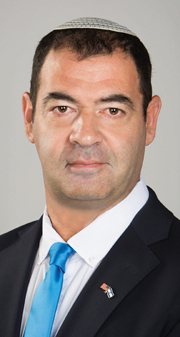
Another cycle of the Hebrew calendar has come to an end. In a few days, according to the Jewish tradition, we will celebrate the beginning of a New Hebrew Year — 5780. These days are times of soul searching. A time for us to stop our routine and look back at the year that is ending as well as anticipate the New Year that is just around the corner.
I would like to take this opportunity to focus on the relationship between Israel and the Jewish communities in the Diaspora. One does not have to be a scholar to know that during the last few years there has been a constant feeling of tension between Israel, or maybe we should say the Israeli government, and the Jewish Diaspora. This tension is not new and it seems that it has always been hanging above our heads. Nevertheless, it still seems that since the decision of the Israeli government to suspend the “Sharansky Report” (June 2017) by not recognizing the new official egalitarian plaza adjacent to the traditional Orthodox plaza at the Kotel (Western Wall), things have deteriorated.
After this came the “Nationality Law” (July 2019), a piece of Israeli legislation, which, however well intentioned, became incredibly divisive throughout the Diaspora. Additionally, we cannot forget that during all of these years the “Conversion Issue” has not yet been addressed to the disappointment and frustration of myself, and most importantly the Diaspora.
Recently the Israeli government decided to bar two Congresswomen from entering the state of Israel, due to their ongoing active support of the BDS movement. BDS, also known as the Boycott, Divestment and Sanctions movement, is a campaign that has one goal on its agenda: to delegitimize the very existence of the state of Israel. This decision regarding the Congresswomen has once again frayed the unity of our communities.
Today at first sight, it could appear as if the major Jewish communities are disagreeing upon too many core issues. One may ask: Where are we heading? How much more can we distance ourselves from each other? As the consul general of the state of Israel to the southwest, I have the privilege and honor to meet many leaders and the individuals who make up the Jewish community who are frustrated, angry and worst of all feel alienated from Israel. I hear them; I understand their genuine frustration and my heart goes out to them as they are members of our Israeli family.
My dear friends, during this time of the year as we enter into the High Holy Days, I would like to suggest that we all stop. We will have plenty of time and opportunities to argue and debate. But for now, let us put our differences on hold — at least for this special time of year. Let us focus on something that for too long we have forgotten or ignored. When was the last time we put aside the differences between us and instead focused on the common values, beliefs and goals that we as a people share.
Believe me my friends, not everything is politics! The vast majority of the Jewish community, both in Israel and the United States, believe in our mutual destiny. We know that the deep bond between us is undeniable and irrevocable. There is a fascinating story about Rabbi Arye Levin, a very well-known rabbi who lived in Israel during the first half of the 20th century. He was known for his endless love for each and every Jew. It was told that there was once a time when the rabbi and his wife went to see the doctor. Upon arriving, the doctor asked them for the reason they came to see him. Rabbi Arye Levin answered, “My wife has an issue with her leg and we both feel the pain.” Although we have our disagreements and even argue between ourselves, at the end of the day we all feel each other’s pain.
That feeling is stronger than anything we can imagine. It shows us time and time again just how close and dependent we are on one another. Knowing and remembering that, especially around this time of year, enables us to foresee our mutual future in the true context of yachad — together. Allow me to end by quoting from Ecclesiastes chapter 4 verses 9-12:
9: “Two are better than one; because they have a good reward for their labor.
10: For if they fall, the one will lift up his fellow; but woe to him that is alone when he falleth, and hath not another to lift him up.
11: Again, if two lie together, then they have warmth; but how can one be warm alone?
12: And if a man prevail against him that is alone, two shall withstand him; and a threefold cord is not quickly broken.”
Shanah Tova!
Gilad Katz is Consul General of Israel to the Southwest, based in Houston, which is responsible for the six-state region of Arkansas, Kansas, Louisiana, New Mexico, Oklahoma and Texas.